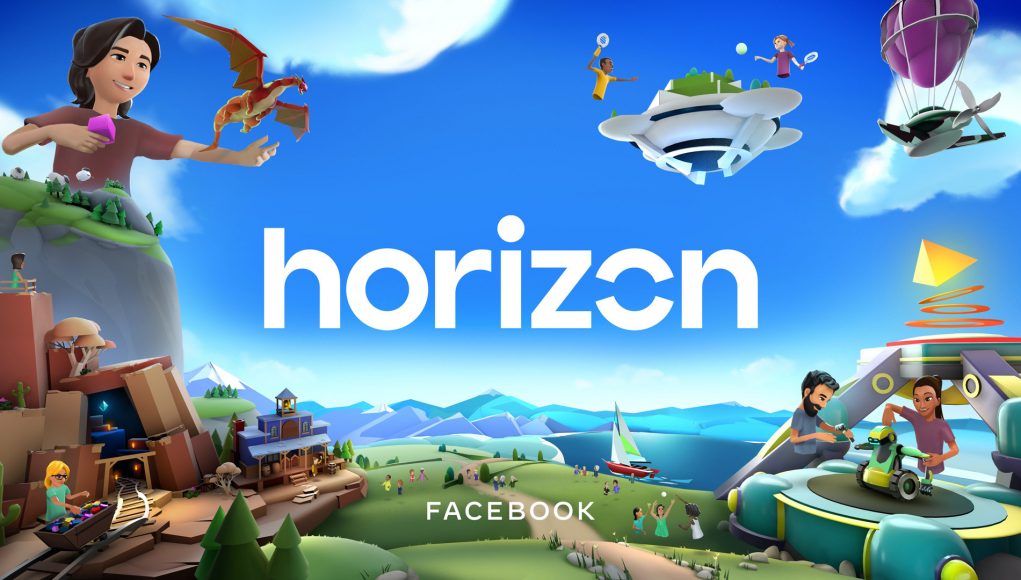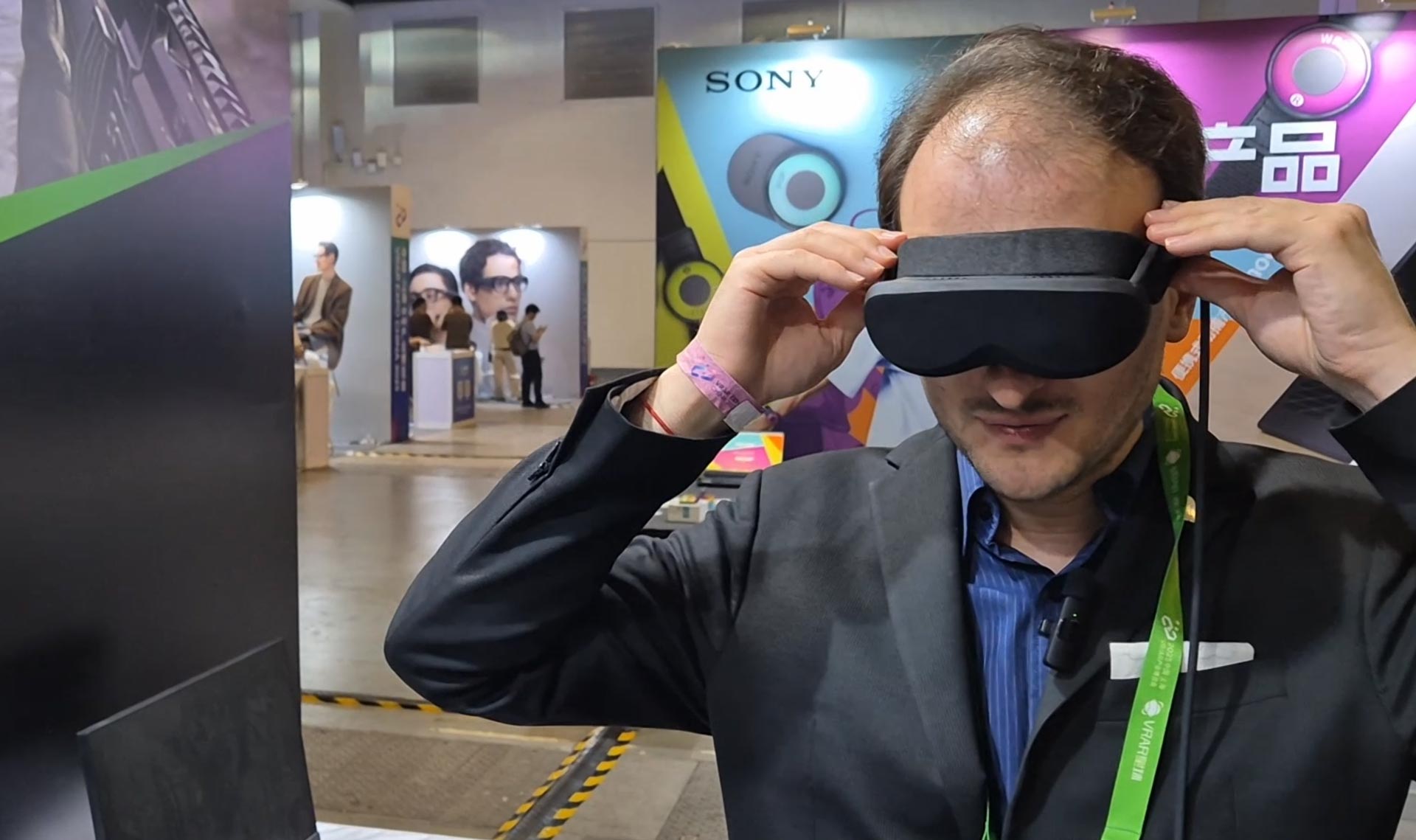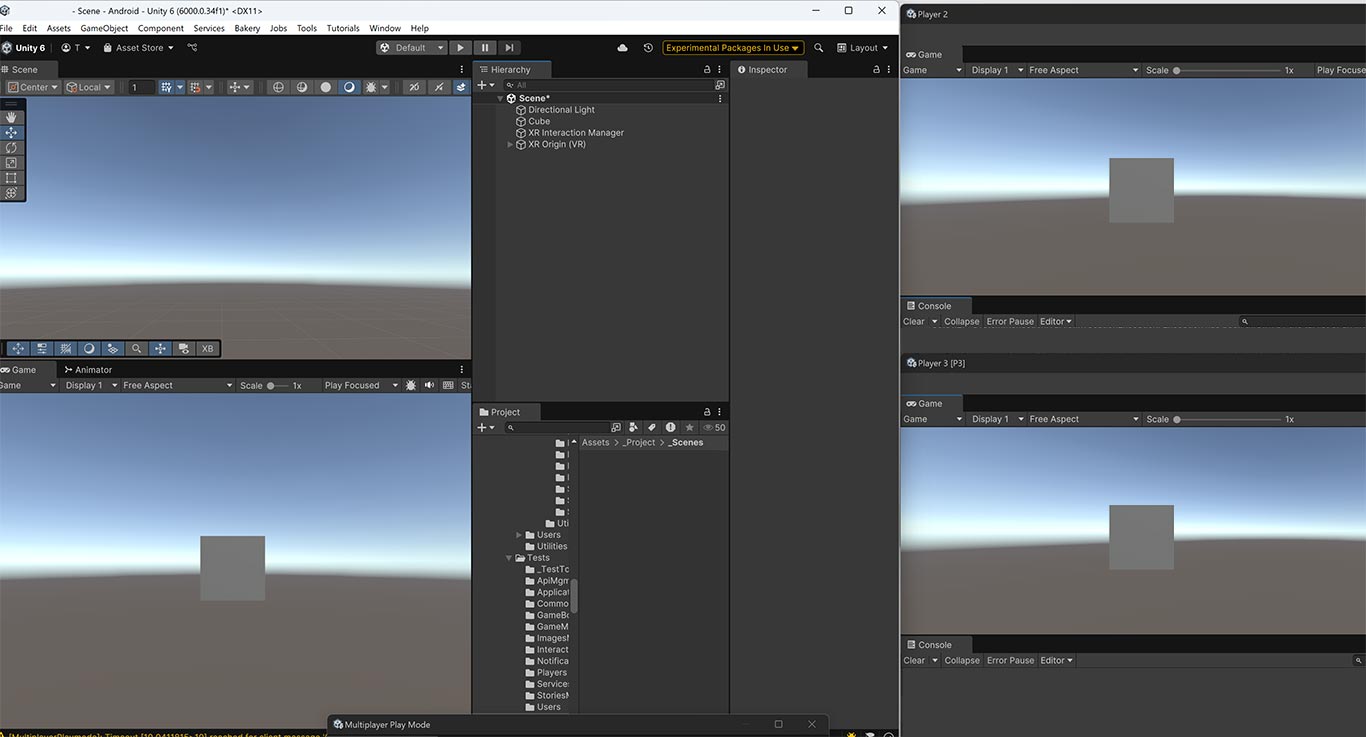My professional opinion on Facebook Horizon
Today I woke up finding on the various VR magazines the preview reviews about the upcoming Facebook Horizon. Unluckily I have not been among the lucky ones that have had the opportunity of trying it in preview (probably the meme of Zuck dressed as an angel that I used in my previous posts has not helped my relationships with Facebook :D), but I have read many of the published reviews because I’m actually very interested in the product.
You for sure know that I collaborate with VRrOOm for various VR festivals like the concert of Jean Michel Jarre (in a few days, visit the Venice VR Expanded world that I contributed to building!), so for me, the topic of social VR spaces is pretty hot. As a professional working on VR events and enjoying social moments in VR, I want to give you briefly my impression of what we now know about Horizon.
What we know about Facebook Horizon
I invite you to read the reviews that Road To VR and Upload VR have written about Horizon to discover what we now know about the platform. To summarize it in some bullet points:
- It seems a lot Rec Room for now;
- It is deeply built on the Facebook framework, but you can still use your Oculus username and friends;
- The graphics are cartoonish and pretty simple;
- Everyone in Horizon can build worlds easily by using some internal creation tools in VR. Imagine something like Anylands, Google Blocks, etc…;
- Worlds can be interactive, and you can develop interactions without needing to know how to code;
- The mini-worlds that you create can support up to 8 people;
- There are very strong moderation tools, and Facebook will supervise all that happens in its metaverse, banning everyone that doesn’t adhere to the community guidelines.
It is only a beta

I want to make clear that Horizon, at the time of writing, is not even in an open beta stage, so it is just at the beginning of its journey. I will so comment here what we know now about it, making clear that the software will surely change a lot in the upcoming months, and we don’t know how.
These kinds of social ecosystems evolve following what happens inside there, depending on what the community does the most. Usually, the developing companies give a starting direction, but then it is the community with its content and its behavior that defines what is going to be the real ecosystem there, also influencing what will be the next steps of the platform holder.
I highlight this because, as Upload writes, we have no idea of how Facebook Horizon will be in 1 year, and I guess Facebook itself doesn’t know. Facebook will release in the wild the software and see what sticks more, then adapt to it. For the good or the bad, Facebook has a great talent in gathering the data of its users and analyzing it, so if it will manage to attract a good number of users in the beginning, it could have enough data to improve Horizon in the right direction. So, I can only give you my impressions based on what I’ve read and seen until now, hoping that it will contribute to helping Facebook in shaping a better metaverse.
Facebook Horizon is not an enterprise tool (for now)

As someone that works in the VR events field, I see the first news we have on Horizon with much disappointment. I was pretty confident about Horizon potentially being a good space to organize events thanks also to the big backend of Facebook, which supports billions of people sharing stuff on social media, but the first news we have on it is not good in this sense.
The reasons are mostly four. The first one is the graphics: most people organizing events, festivals, and concerts want “WOW” graphics. Other people organizing workshops and meetings want serious and professional graphical elements. The cartoon style used by Facebook is good for almost no kind of events: when I proposed Altspace to some customers, they refused it because they told me that it “looks like the world of the Playmobil”. While I personally love Altspace and its community tools, I agree that it doesn’t look much like a corporate space. That’s why for professional meetings, Spatial is much better. And the style of Horizon is much more cartoonish and fun than the one of Altspace, so it would be an instant no for companies. We have no idea if with Horizon you can create games and content with the graphical style that you want, or if you have to adhere to its cartoon graphical style. If it is the second one, it could be a serious problem for all the content creators.
The second reason is the capacity of the worlds. When I tell people that VRChat can host maximum 40 people per room they get crazy because they say that they are too few. Some people, because of the COVID, want even to have conferences with hundreds of thousands of people together in the same room. Imagine if I have to tell them that they can have a maximum of 8 people… they would kick my a** in seconds.
The third reason is Facebook. Apart from the data harvesting practices, with which you may agree or not, Facebook is seen as a personal tool used for leisure. Using it for concerts would still be acceptable, but for corporate workshops, it would be unacceptable. Once VRgineers CEO told me that companies even have problems installing Steam, that is a game store, inside their enterprise environments to use VR… imagine if these people would be required to use Facebook.
The fourth reason is the creation tools. While it is fun that I can add some shapes and put some logic to create a game all while being in VR, to create cool events like concerts in VR you usually want much more powerful development tools. We use VRChat because it lets us use Unity for development purposes, and the new SDK3 with Udon also lets us visually code many interactions. The no-code creation tools are usually nice to make some toy programs, but they have a limit: if VRChat has implemented a scripting language in the end, there is a reason. The visual tools are good up to a point… and if Facebook wants to take Horizon to the next level, it has to implement something more powerful, maybe Javascript.
So, for now, I don’t see Horizon as a compelling tool for VR events. It may be useful for marketing though… companies may create some little Horizon worlds for potential customers to explore and become more attracted to the brands. This is a possibility I could actually propose to some customers… and if Facebook would add some dedicated logic, it could be possible to connect a product that you are seeing in VR also to the web page to buy it… but again, if the only choice is the cartoon graphics, only a limited number of brands could be interested.

Anyway, I’ll keep an eye on how it will evolve… Facebook is used by billions of people, so Horizon could be a nice platform to attract many people to an event in the future. Let’s see if it will be something Facebook wants to bet on or not. For now, my impression is that they’re clearly aiming just at the consumer market.
Facebook Horizon seems having too much control on consumers
Trolling and harassment are a big problem for social VR worlds: we all still have in mind the disaster that happened the first weeks that VRChat became popular, where many girls were harassed on the platform, and VRChat got a bad reputation. Facebook knows it very well and it wants to prevent this kind of behavior thanks to various strong moderation tools, that are really well studied so that to guarantee a healthy social world. I really appreciate the effort by Facebook in this sense, but I think that the solution that it has proposed is so exaggerated in this sense that it becomes cringy.
Basically, while you are in Horizon, everyone records everyone. The last few minutes of what you’re seeing and doing are recorded and stored on your device, so that if someone reports your behavior or you report the behavior of someone else, the recording of all the involved users is sent to facebook, where a dedicated person will analyze the footage and take appropriate actions (like banning one of the users).
Apart from this p2p surveillance, everyone can summon a person from Facebook, or Facebook itself may decide to summon one of its employees if it sees something weird happening in one of the worlds. When this person is summoned, it gets to the Horizon world where there could be a problem, and without being seen by the others it can watch what it is happening. When one of the employees from Facebook is inside your Horizon world, you don’t get notified of his presence.
On Facebook Horizon, you may be observed by Facebook every time. Whatever you do, whatever you say, can be watched by some community guide in whatever moment, without you even knowing. I know that these measures have been thought for the good, but actually they look quite creepy. It seems to me like when I’m in Shenzhen and I know that whatever I do is recorded through the various cameras installed by the local government to keep the city free of criminals. Whatever I do, I know I’m being watched, and as Ben Lang says on Road To VR, my behavior is not the same that I would have if I were not controlled, even if I’m not a criminal.

This will become true especially if I think about doing something that is borderline with the rules, like pranking a friend of mine: what if someone from Facebook misunderstands my prank and bans me? Maybe I would be less prone to be funny in Horizon, because I know I could be watched by someone that is paid to be there and have little sense of humor.
People should also adhere to Facebook Community Standards. So… what about if in Horizon I want to talk about porn, I want to say bad words? What is going to happen? In an open ecosystem, I could do that with my friends provided that we all want to do that. But what if one of the Horizon Ghost Cops are watching us?
Of course, don’t forget that Horizon works on the Facebook platform, so the data about what you’re doing there will be harvested. Are you really going to visit the world about horseporn (I hope you got the reference to the Jenny McCarthy Show) knowing that Zuck will learn about your kinkiest perversions? I think not.
With these rules, Horizon seems to become the perfect city that Dr.Cocteau was building inside the movie Demolition Man. A metaverse where people can only smile, play, and do only nice things that are permitted by the rules. This is something that can be good for little kids, or to make people make little games with friends, like in Rec Room (that anyway is used only by little kids). It could also be a good idea just to hang out and play minigames with friends, like when you go to an amusement park. But as a grown up people that loves Futurama and South Park, I don’t find it as my ideal metaverse. Zuck should remember that in Demolition Man people loved Stallone and Snipes, not Cocteau.
If Facebook wants really Horizon to become a metaverse, IMHO it has to do these things:
- Removing all this control. The most successful VR metaverse we have now is VRChat and the reason is that it is free, open, and crazy that people love going there and do crazy stuff. In VRChat you can have the avatar you want (NSFW-ish ones are also allowed), you can curse, you can create your worlds and do whatever you want, apart from things that are illegal and other few stuff like porn. Second Life became also popular because it let people fulfill their darkest sexual fantasies. The most successful virtual spaces are the ones that let the community express itself completely: so while Sansar spent millions to create a heavy virtual world with beautiful graphics and failed, VRChat let the community embody little anime girls or memes and succeeded. Knowing that you’re potentially always under control in Horizon is weird. Having strict community rules can hurt the fun of grown-up people. Facebook should give more freedom to the inhabitants of its metaverse;
- Offering high-quality content. We humans can stand paying a high price for having something good in return. If Facebook will invest millions in compelling content for Horizon, then people may find it valuable going there to enjoy it. For instance, if there will be worlds for popular games, actresses, k-pop singers, etc.. all the million fans will go there notwithstanding all the community control and will become used to this ecosystem;
- Offering high quality content creation tools. Like I said before: if the content creation tools will offer the possibility of creating impressive content and not just some cartoon toy worlds, then the people will want to join Horizon to enjoy these creations.
It doesn’t seem a potential hit for now

From the few info we have until now, Horizon seems doomed to fail as a metaverse. It would be the third failure about a metaverse from Facebook after Facebook Spaces and the Oculus Home 2.0. It seems that Facebook hasn’t understood what people really want to do in a virtual world yet. It hasn’t also understood completely that people are already scared by the Facebook brand, and so creating something branded by Facebook with surveillance control everywhere is a terrible idea. Horizon is thought of as a metaverse, a place where you potentially spend many hours of your day, and in the future maybe also all your life. Would you abandon your free life for a cartoonish virtual place where you are always under control? Personally… meh.
Also the cartoonish graphical style may be enjoyable for little people, but personally, I’m not a huge fan of it. It is a matter of taste, but you have to consider that for instance the program similar the most to Horizon is Rec Room and in fact many Rec Room players are kids. It seems that Horizon may appeal to little kiddos as well with this style if it will be confirmed. I don’t know how much it will stick with grown-up people.
In the best scenario, I see Horizon succeeding as a multiplayer gaming system like Rec Room, where people go there and enjoy their time together on a Quest. And in my opinion, it would already be a good result, but I think that Zuck has other plans.
On the other side, we know very few about Horizon and the future plans that Facebook has for it. Maybe through strong partnerships and great content the platform will thrive. Maybe Facebook will never actually enforce these “community rules” and will control and ban people only in a few cases, that is for terrible things that are actually happening. We don’t know, but we’ll discover soon.
I’m not excited by Horizon today, but I’m open to be surprised in the future. Good luck to the developers and creatives working on it.
(Header image by Facebook)
Disclaimer: this blog contains advertisement and affiliate links to sustain itself. If you click on an affiliate link, I'll be very happy because I'll earn a small commission on your purchase. You can find my boring full disclosure here.




